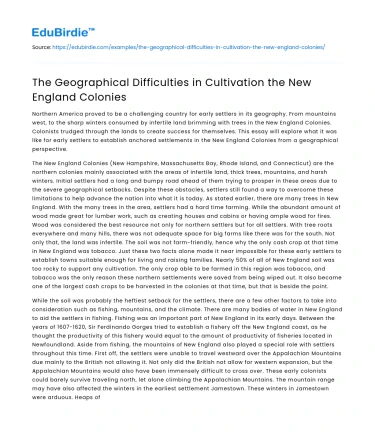Northern America proved to be a challenging country for early settlers in its geography. From mountains west, to the sharp winters consumed by infertile land brimming with trees in the New England Colonies. Colonists trudged through the lands to create success for themselves. This essay will explore what it was like for early settlers to establish anchored settlements in the New England Colonies from a geographical perspective.
The New England Colonies (New Hampshire, Massachusetts Bay, Rhode Island, and Connecticut) are the northern colonies mainly associated with the areas of infertile land, thick trees, mountains, and harsh winters. Initial settlers had a long and bumpy road ahead of them trying to prosper in these areas due to the severe geographical setbacks. Despite these obstacles, settlers still found a way to overcome these limitations to help advance the nation into what it is today. As stated earlier, there are many trees in New England. With the many trees in the area, settlers had a hard time farming. While the abundant amount of wood made great for lumber work, such as creating houses and cabins or having ample wood for fires. Wood was considered the best resource not only for northern settlers but for all settlers. With tree roots everywhere and many hills, there was not adequate space for big farms like there was for the south. Not only that, the land was infertile. The soil was not farm-friendly, hence why the only cash crop at that time in New England was tobacco. Just these two facts alone made it near impossible for these early settlers to establish towns suitable enough for living and raising families. Nearly 50% of all of New England soil was too rocky to support any cultivation. The only crop able to be farmed in this region was tobacco, and tobacco was the only reason these northern settlements were saved from being wiped out. It also became one of the largest cash crops to be harvested in the colonies at that time, but that is beside the point.
Save your time!
We can take care of your essay
- Proper editing and formatting
- Free revision, title page, and bibliography
- Flexible prices and money-back guarantee
While the soil was probably the heftiest setback for the settlers, there are a few other factors to take into consideration such as fishing, mountains, and the climate. There are many bodies of water in New England to aid the settlers in fishing. Fishing was an important part of New England in its early days. Between the years of 1607-1620, Sir Ferdinando Gorges tried to establish a fishery off the New England coast, as he thought the productivity of this fishery would equal to the amount of productivity of fisheries located in Newfoundland. Aside from fishing, the mountains of New England also played a special role with settlers throughout this time. First off, the settlers were unable to travel westward over the Appalachian Mountains due mainly to the British not allowing it. Not only did the British not allow for western expansion, but the Appalachian Mountains would also have been immensely difficult to cross over. These early colonists could barely survive traveling north, let alone climbing the Appalachian Mountains. The mountain range may have also affected the winters in the earliest settlement Jamestown. These winters in Jamestown were arduous. Heaps of settlers were to die in the first winter at the first permanently established colony. Winters on the eastern coast were excessively bitter and filled with snow. Jamestown nearly failed due to the winters being so harsh. Settlers could not harvest food or plant seeds during these winters. This difficult season in New England was arguably one of the largest hindrances to settlement apart from the infertile soil.
Settlers had a difficult time trying to cultivate the New England Colonies. Although the many hardships they were forced to face such as the Appalachian Mountains, rocky soil that demonstrated the weak farming capabilities, trees blanketing the land, and extreme winters these colonists were able to prosper. While the earliest of times of migration to the north proved to be problematic and troublesome, as time went by these adventurous colonists were able to become familiar and comfortable with the land that they call home. This essay helped demonstrate what it was like for the colonists to settle New England from a geographical perspective.






 Stuck on your essay?
Stuck on your essay?

